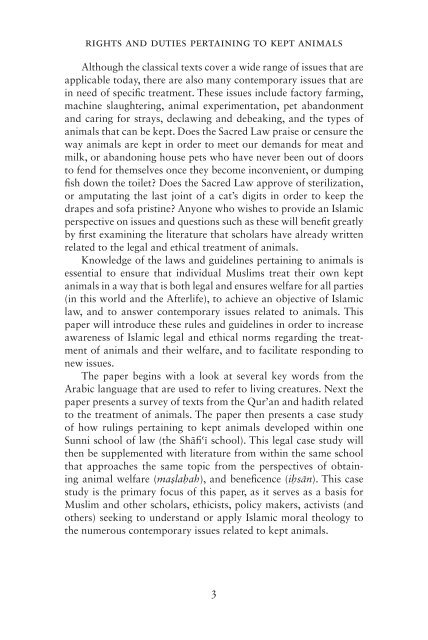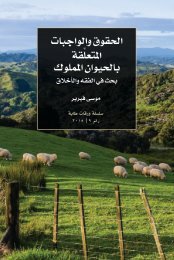Rights and Duties Pertaining to Kept Animals
1RcDQG8
1RcDQG8
You also want an ePaper? Increase the reach of your titles
YUMPU automatically turns print PDFs into web optimized ePapers that Google loves.
<strong>Rights</strong> <strong>and</strong> duties pertaining <strong>to</strong> kept animals<br />
Although the classical texts cover a wide range of issues that are<br />
applicable <strong>to</strong>day, there are also many contemporary issues that are<br />
in need of specific treatment. These issues include fac<strong>to</strong>ry farming,<br />
machine slaughtering, animal experimentation, pet ab<strong>and</strong>onment<br />
<strong>and</strong> caring for strays, declawing <strong>and</strong> debeaking, <strong>and</strong> the types of<br />
animals that can be kept. Does the Sacred Law praise or censure the<br />
way animals are kept in order <strong>to</strong> meet our dem<strong>and</strong>s for meat <strong>and</strong><br />
milk, or ab<strong>and</strong>oning house pets who have never been out of doors<br />
<strong>to</strong> fend for themselves once they become inconvenient, or dumping<br />
fish down the <strong>to</strong>ilet? Does the Sacred Law approve of sterilization,<br />
or amputating the last joint of a cat’s digits in order <strong>to</strong> keep the<br />
drapes <strong>and</strong> sofa pristine? Anyone who wishes <strong>to</strong> provide an Islamic<br />
perspective on issues <strong>and</strong> questions such as these will benefit greatly<br />
by first examining the literature that scholars have already written<br />
related <strong>to</strong> the legal <strong>and</strong> ethical treatment of animals.<br />
Knowledge of the laws <strong>and</strong> guidelines pertaining <strong>to</strong> animals is<br />
essential <strong>to</strong> ensure that individual Muslims treat their own kept<br />
animals in a way that is both legal <strong>and</strong> ensures welfare for all parties<br />
(in this world <strong>and</strong> the Afterlife), <strong>to</strong> achieve an objective of Islamic<br />
law, <strong>and</strong> <strong>to</strong> answer contemporary issues related <strong>to</strong> animals. This<br />
paper will introduce these rules <strong>and</strong> guidelines in order <strong>to</strong> increase<br />
awareness of Islamic legal <strong>and</strong> ethical norms regarding the treatment<br />
of animals <strong>and</strong> their welfare, <strong>and</strong> <strong>to</strong> facilitate responding <strong>to</strong><br />
new issues.<br />
The paper begins with a look at several key words from the<br />
Arabic language that are used <strong>to</strong> refer <strong>to</strong> living creatures. Next the<br />
paper presents a survey of texts from the Qur’an <strong>and</strong> hadith related<br />
<strong>to</strong> the treatment of animals. The paper then presents a case study<br />
of how rulings pertaining <strong>to</strong> kept animals developed within one<br />
Sunni school of law (the Shāfiʿī school). This legal case study will<br />
then be supplemented with literature from within the same school<br />
that approaches the same <strong>to</strong>pic from the perspectives of obtaining<br />
animal welfare (maṣlaḥah), <strong>and</strong> beneficence (iḥsān). This case<br />
study is the primary focus of this paper, as it serves as a basis for<br />
Muslim <strong>and</strong> other scholars, ethicists, policy makers, activists (<strong>and</strong><br />
others) seeking <strong>to</strong> underst<strong>and</strong> or apply Islamic moral theology <strong>to</strong><br />
the numerous contemporary issues related <strong>to</strong> kept animals.<br />
3



